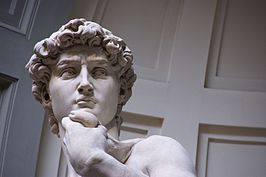
< /ʒɑk lwi/, 1748–1825, French painter.
noun
- 1084–1153, king of Scotland 1124–53.
noun
- the second king of the Hebrews (about 1000–962 bc), who united Israel as a kingdom with Jerusalem as its capital
- Elizabeth . 1914–92, British cookery writer. Her books include Mediterranean Food (1950) and An Omelette and a Glass of Wine (1984)
- (French david) Jacques Louis (ʒɑk lwi). 1748–1825, French neoclassical painter of such works as the Oath of the Horatii (1784), Death of Socrates (1787), and The Intervention of the Sabine Women (1799). He actively supported the French Revolution and became court painter to Napoleon Bonaparte in 1804; banished at the Bourbon restoration
- Saint . 6th century ad, Welsh bishop; patron saint of Wales. Feast day: March 1
noun
- 1084–1153, king of Scotland (1124–53) who supported his niece Matilda’s claim to the English throne and unsuccessfully invaded England on her behalf
masc. proper name, in Old Testament second king of Israel and Judah and author of psalms, from Hebrew Dawidh, literally “darling, beloved friend.” The name was common in England and Scotland by 12c., but much earlier in Wales. A nickname form was Dawe, hence surnames Dawson, Dawkins. A top 10 list name for boys born in the U.S. from 1934 to 1992.
A great king of the Israelites in the Old Testament. David was a shepherd in his boyhood. As a youth, he asked for King Saul‘s permission to fight Goliath, the giant Philistine warrior whom all the other Israelites were afraid to face. Despite his small size, David managed to kill Goliath by hitting him in the forehead with a stone flung from a sling. King Saul then gave David command of his army, but he grew jealous of him and tried to kill him; David spent many years fleeing from Saul. After Saul’s death, David was made king of the Israelites and served nobly, despite occasional lapses, such as an affair with Bathsheba; he had Bathsheba’s husband killed so that he could marry her. Many of the Psalms are attributed to David, who was famed as a harpist. His descendants, the House of David, included Solomon and the subsequent kings of Israel and Judah; according to the Gospels, Jesus was descended from David.
A large marble statue made by Michelangelo of the biblical king David. Michelangelo portrays him as a youth just about to do battle with the giant Goliath.
 Liberal Dictionary English Dictionary
Liberal Dictionary English Dictionary

